9 easy tips for a fright-free fall with your furry friend
 While unexpected illnesses and injuries can happen at any time during the year, some are more prevalent seasonally. Keep reading to learn about a few potential pet concerns to keep in mind as we head into the fall season.
While unexpected illnesses and injuries can happen at any time during the year, some are more prevalent seasonally. Keep reading to learn about a few potential pet concerns to keep in mind as we head into the fall season.
No tricks, no treats
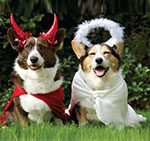 It’s best to keep your cat or dog on their regular diet during the holidays. Keep Halloween candy and Thanksgiving foods out of their reach. Chocolate and candy with Xylitol, like sugar-free gum, will make your pet sick. Check with your veterinarian who knows your pet if a little turkey is a safe snack.
It’s best to keep your cat or dog on their regular diet during the holidays. Keep Halloween candy and Thanksgiving foods out of their reach. Chocolate and candy with Xylitol, like sugar-free gum, will make your pet sick. Check with your veterinarian who knows your pet if a little turkey is a safe snack.
Halloween is the start of the “season” for chocolate-related illnesses, most commonly chocolate toxicity. Trupanion sees a 71% increase in chocolate toxicity during Halloween compared to the previous six months of the year.
On average, chocolate-related health issues cost pet owners about $240 per claim, but some claims can be as high as $1,200. Both cats and dogs are at risk for chocolate poisoning, but there are more reported cases of dogs since they will typically eat anything.
Dogs get the flu too!
Canine flu and bordetella, or “kennel cough,” are both airborne diseases. If you see a dog that is coughing, keep your own dog away and avoid touching the ill dog. If your dog develops a cough or high fever, contact your veterinarian immediately.
Tips from Trupanion’s Director of Veterinary Services, Denise Petryk, DVM: Kennel cough is highly contagious and can cause a variety of symptoms ranging from dry cough for a couple days, to fever, anorexia, severe pneumonia, and death. Keep your dog away from other dogs when coughing for at least a week after you hear the last cough.
Holiday stress isn’t just for humans
 Lots of unfamiliar faces and loud talking and laughter can stress your pet out. Exercise your dog beforehand and give them a special chew toy to keep them distracted. If they still seem stressed, put them in a quiet room away from all of the commotion. Be sure cats have access to a quiet room where they will probably hide all on their own.
Lots of unfamiliar faces and loud talking and laughter can stress your pet out. Exercise your dog beforehand and give them a special chew toy to keep them distracted. If they still seem stressed, put them in a quiet room away from all of the commotion. Be sure cats have access to a quiet room where they will probably hide all on their own.
Keep pests out
As the weather turns cooler in fall, rats and mice may decide that your house would be a great place to stay warm and dry. Be mindful of how you prevent these pests from entering your home. To keep them out, close up any entry holes and choose anti-rodent products that are nontoxic. Rodenticides are extremely toxic to dogs and cats, so it is best to discuss a safe control plan with a professional exterminator and your veterinarian.
Back-to-school supplies
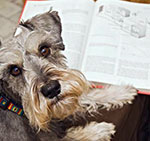 Now that kids are back in school, make sure you keep items like pencils, markers, and glue sticks out of your pet’s reach. If they decide the new school supplies would make great snacks, they might get gastrointestinal upset or blockages. Cats are more likely to bite the edges of notebooks and paper.
Now that kids are back in school, make sure you keep items like pencils, markers, and glue sticks out of your pet’s reach. If they decide the new school supplies would make great snacks, they might get gastrointestinal upset or blockages. Cats are more likely to bite the edges of notebooks and paper.
Foreign body ingestion tops the list for both puppies and kittens, and it is one of our most frequent claims for all cats and dogs. Depending on the object ingested, treatment can be costly — with an average cost of $1,400.
Snakes
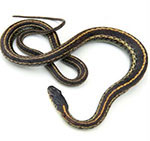 Snakes get grumpy as they’re preparing to hibernate, and don’t take kindly to being disturbed by curious cats or dogs. To protect your pets from venomous snake bites, know which snakes are poisonous and where they usually hibernate. Walk your dog (or cat) on a leash away from those areas. If your pet does get bitten, go to your veterinarian immediately.
Snakes get grumpy as they’re preparing to hibernate, and don’t take kindly to being disturbed by curious cats or dogs. To protect your pets from venomous snake bites, know which snakes are poisonous and where they usually hibernate. Walk your dog (or cat) on a leash away from those areas. If your pet does get bitten, go to your veterinarian immediately.
Mushrooms
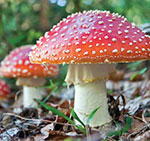 Keep your pets from eating mushrooms that pop up on lawns, under trees, in fields, and on logs. While some won’t make your pet sick, a few are deadly. If your pet accidentally eats one, especially if they seem to have a reaction to it, or you know the mushroom is toxic, go to your veterinarian as soon as possible.
Keep your pets from eating mushrooms that pop up on lawns, under trees, in fields, and on logs. While some won’t make your pet sick, a few are deadly. If your pet accidentally eats one, especially if they seem to have a reaction to it, or you know the mushroom is toxic, go to your veterinarian as soon as possible.
Car coolants
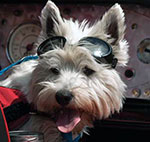 Fall is a great time to change your car’s engine coolant, but be careful because most coolants are highly toxic to pets. Clean up any spills immediately, keep any remaining new coolant out of reach, and dispose of used coolant. Also, consider switching to a propylene glycol-based coolant — while not completely nontoxic, it’s significantly less toxic than other engine coolants.
Fall is a great time to change your car’s engine coolant, but be careful because most coolants are highly toxic to pets. Clean up any spills immediately, keep any remaining new coolant out of reach, and dispose of used coolant. Also, consider switching to a propylene glycol-based coolant — while not completely nontoxic, it’s significantly less toxic than other engine coolants.
Allergies
Just like people who have seasonal allergies, your cat or dog may also react to pollen, dust, or other allergens. Pet allergy symptoms can be similar to ours — sneezing or coughing, runny nose, itchy skin, ear infection, and itchy, red, or watery eyes. If you think your pet might be suffering from allergies, call your veterinarian to discuss testing and treatment plans best suited for your pet’s needs.
Top 12 Dog Breeds Most Prone to Allergies
- English Bulldog
- French Bulldog
- West Highland White Terrier
- American Bulldog
- Basset Hound
- Rhodesian Ridgeback
- American Pit bull Terrier
- Shiba Inu
- Bichon Frise
- Boston Terrier
- Miniature Poodle
- Yorkie x Poodle
